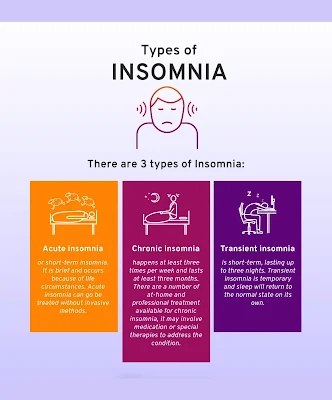What could be the reason for not being able to sleep at night and what disease would this be called?
What could be the reason for not being able to sleep at night and what disease would this be called?
Difficulty sleeping at night, commonly known as insomnia, can be caused by a wide range of factors. Insomnia is a sleep disorder characterized by trouble falling asleep, staying asleep, or getting restful sleep. Below, I'll outline various causes of insomnia.
•Stress: High levels of stress can lead to hyperarousal, making it difficult to fall asleep. Worries about work, health, or finances can keep your mind active at night.
•Anxiety: Anxiety disorders can make it hard to sleep, often causing racing thoughts or a feeling of being overwhelmed.
•Depression: Depression can disrupt sleep patterns, leading to insomnia. People with depression might wake up early and be unable to get back to sleep.
2. Medical Conditions:-
•Chronic Pain: Conditions like arthritis, fibromyalgia, or back pain can make it uncomfortable to sleep.
•Asthma or Other Respiratory Issues: Breathing problems can disrupt sleep, leading to frequent awakenings.
•Gastroesophageal Reflux Disease (GERD): Acid reflux can cause discomfort and interrupt sleep.
•Neurological Disorders: Diseases like Parkinson’s or Alzheimer’s can affect the brain's sleep regulation.
3. Medications:-
•Some medications can interfere with sleep. This includes certain antidepressants, medications for asthma, or high blood pressure. Stimulants such as ADHD medications can also cause insomnia.
4. Lifestyle Factors:-
•Caffeine and Nicotine: Both are stimulants that can keep you awake if consumed too close to bedtime.
•Alcohol: While alcohol may initially make you sleepy, it can disrupt sleep later in the night.
•Irregular Sleep Schedules:
Irregular sleep patterns due to shift work, travel (jet lag), or other factors can disrupt the body's circadian rhythm.
•Poor Sleep Habits: Activities like watching TV or using electronic devices in bed can interfere with sleep.
5. Environmental Factors:-
•Noise: A noisy environment can prevent you from falling asleep or wake you up during the night.
•Light: Exposure to light, especially blue light from screens, can suppress melatonin production, making it harder to sleep.
•Temperature: A room that is too hot or too cold can disrupt sleep.
Types of Insomnia:-
1. Acute Insomnia: Short-term insomnia often caused by life events such as stress, illness, or significant changes.
2. Chronic Insomnia: Long-term insomnia that occurs at least three nights per week for three months or longer. It can be primary (not associated with any other health condition) or secondary (related to a health condition).
3. Transient insomnia: is defined as lasting for a few nights. Intermittent insomnia is periodic episodes of insomnia. Chronic insomnia occurs on most nights and lasts a month or more.
What could be the reason for not being able to sleep at night and what disease would this be called?
Diagnosing Insomnia
Diagnosing insomnia typically involves:-
•Sleep History: A detailed history of your sleep patterns, lifestyle, and medical history.
•Sleep Diary: Keeping a sleep diary can help track sleep patterns and identify factors contributing to insomnia.
•Medical Examination: To rule out medical conditions that may cause sleep problems.
•Polysomnography: In some cases, a sleep study might be conducted to observe sleep patterns and identify underlying disorders.
Treatment Options:-
1. Cognitive Behavioral Therapy for Insomnia (CBT-I)
•CBT-I is considered the first-line treatment for chronic insomnia. It involves techniques to change thoughts and behaviors that cause or worsen sleep problems.
2. Medications
•Prescription Medications: Sedative-hypnotics and other medications can be prescribed but are typically used for short-term relief.
•Over-the-Counter (OTC) Medications: Antihistamines are sometimes used, though they are not recommended for long-term use due to potential side effects.
3. Lifestyle Changes
•Sleep Hygiene: Establishing good sleep habits, such as maintaining a regular sleep schedule, creating a restful environment, and avoiding stimulants before bedtime.
•Relaxation Techniques: Practices like meditation, deep breathing exercises, and progressive muscle relaxation can help reduce stress and promote sleep.
4. Alternative Therapies
•Melatonin Supplements: Melatonin can help regulate the sleep-wake cycle.
•Herbal Remedies: Some people find relief with herbal supplements like valerian root or chamomile, though scientific evidence is mixed.
Managing Underlying Conditions
If insomnia is caused by another medical condition, addressing that condition can help improve sleep.
For example:
•Pain Management: Effective management of chronic pain conditions can reduce sleep disturbances.
•Mental Health Treatment: Therapy and medications for anxiety or depression can improve sleep quality.
Conclusion:-
Insomnia is a complex condition with multiple potential causes, including psychological factors, medical conditions, lifestyle choices, and environmental influences. Effective treatment often requires a multifaceted approach, addressing both the underlying causes and symptoms of insomnia. If you're struggling with insomnia, it's important to consult a healthcare provider to identify the specific factors contributing to your sleep difficulties and develop a tailored treatment plan.







Post a Comment